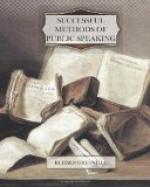Sheridan
Sheridan became a foremost parliamentary speaker and debater, despite early discouragements. His well-known answer to a friend, who adversely criticized his speaking, “It is in me, and it shall come out of me!” has for years given new encouragement to many a student of public speaking. He applied himself with untiring industry to the development of all his powers, and so became one of the most distinguished speakers of his day.
Charles James Fox
Charles James Fox was a plain, practical, forceful orator of the thoroughly English type. His qualities of sincerity, vehemence, simplicity, ruggedness, directness and dexterity, combined with a manly fearlessness, made him a formidable antagonist in any debate. Facts, analogies, illustrations, intermingled with wit, feeling, and ridicule, gave charm and versatility to his speaking unsurpassed in his time.
Lord Brougham
Lord Brougham excelled in cogent, effective argument. His impassioned reasoning often made ordinary things interesting. He ingratiated himself by his wise and generous sentiments, and his uncompromising solicitude for his country.
He always succeeded in getting through his protracted and parenthetical sentences without confusion to his hearers or to himself. He could see from the beginning of a sentence precisely what the end would be.
John Quincy Adams
John Quincy Adams won a high place as a debater and orator in his speech in Congress upon the right of petition, delivered in 1837. A formidable antagonist, pugnacious by temperament, uniformly dignified, a profound scholar,—his is “a name recorded on the brightest page of American history, as statesman, diplomatist, philosopher, orator, author, and, above all a Christian.”
Patrick Henry
Patrick Henry was a man of extraordinary eloquence. In his day he was regarded as the greatest orator in America. In his early efforts as a speaker he hesitated much and throughout his career often gave an impression of natural timidity. He has been favorably compared with Lord Chatham for fire, force, and personal energy. His power was largely due to a rare gift of lucid and concise statement.
Henry Clay
The eloquence of Henry Clay was magisterial, persuasive, and irresistible. So great was his personal magnetism that multitudes came great distances to hear him. He was a man of brilliant intellect, fertile fancy, chivalrous nature, and patriotic fervor. He had a clear, rotund, melodious voice, under complete command. He held, it is said, the keys to the hearts of his countrymen.
Calhoun
The eloquence of John Caldwell Calhoun has been described by Daniel Webster as “plain, strong, terse, condensed, concise; sometimes impassioned, still always severe. Rejecting ornament, not often seeking far for illustrations, his power consisted in the plainness of his propositions, in the closeness of his logic, and in the earnestness and energy of his manner.”




